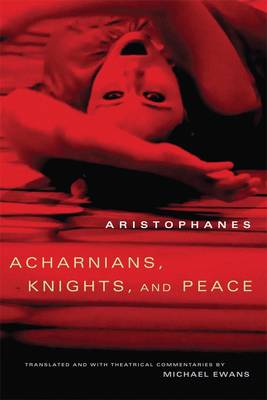
- Retrait gratuit dans votre magasin Club
- 7.000.000 titres dans notre catalogue
- Payer en toute sécurité
- Toujours un magasin près de chez vous
- Retrait gratuit dans votre magasin Club
- 7.000.000 titres dans notre catalogue
- Payer en toute sécurité
- Toujours un magasin près de chez vous
42,45 €
+ 84 points
Description
Lively-and stage-ready-translations of three plays by Aristophanes dealing with war and its aftermath Most readers nowadays encounter the plays of Aristophanes in the classroom, not the theater. Yet the "father of comedy" wrote his plays for the stage, not as literary texts. Many English translations of the plays were written decades ago, and in their outdated language they fail to capture the dramatic liveliness of the original comedies. Here Michael Ewans offers new and lively translations of three of Aristophanes' earliest surviving plays: Acharnians, Knights, and Peace. While remaining faithful to the original Greek, Ewans's translations are accessible to a modern audience-and actable on stage. The first two plays in this volume, Acharnians and Knights, satirize the Athenians for their madness in continuing the Peloponnesian War. The third play, Peace, celebrates the end to all the warmongering. This edition contains all that a reader needs to understand these plays within a broader context. In his comprehensive introduction, Ewans discusses historical, political, and social aspects of Aristophanic comedy, the conventions of Greek theater, and the challenges of translating ancient Greek into modern English. In his theatrical commentaries, Ewans draws on his own experience of directing the plays in a replica of the original theater. In scene-by-scene analysis, he provides insight into the major issues each play raises in performance. The volume concludes with two glossaries-one of proper names and the other of Greek terms-as well as a bibliography that includes the most recent scholarship on Aristophanic comedy. With its accessible format and design, this book serves as a fitting companion to Ewans's recently published edition of Aristophanes' Lysistrata, The Women's Festival, and Frogs. Volume 45 in the Oklahoma Series in Classical Culture Michael Ewans has recently retired as Professor of Drama at the University of Newcastle, New South Wales, Australia. An experienced translator of ancient Greek drama, he has also directed numerous full productions of Greek plays. His published works include translations of plays by Sophocles and Aeschylus as well as three books on opera.
Spécifications
Parties prenantes
- Auteur(s) :
- Editeur:
Contenu
- Nombre de pages :
- 304
- Langue:
- Anglais
- Collection :
Caractéristiques
- EAN:
- 9780806142319
- Date de parution :
- 15-12-11
- Format:
- Livre broché
- Format numérique:
- Trade paperback (VS)
- Dimensions :
- 152 mm x 226 mm
- Poids :
- 453 g







